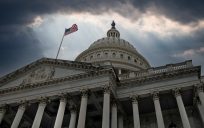The DorobekINSIDER Sequestration reader: Day 5 — Snowquestration
- Sequestration is here, and it’s here to stay for at least a little while. And this new reality has created some major management challenges for government leaders. So how do you manage through the uncertainty? Insights from the Partnership for Public Service.
The DorobekINSIDER Sequestration reader: Day 5 — Snowquestration
The big story impacting Washington, DC wasn’t sequestration, but rather… snowquestration, as a March winter storm was billed by the Washington Post’s Capital Weather Gang.
Overnight, the Office of Personnel Management decided to close federal offices in the Washington area.
Snowquestration was less fierce in DC then predicted, leading to many interesting comments about how it was much ado about not much. My personal favorite came from @ThomWallace:
 An aside: did you know there is a way to get OPM’s status texted to you when it comes through? Try this IFTTT Recipe: OPM status notifier.
An aside: did you know there is a way to get OPM’s status texted to you when it comes through? Try this IFTTT Recipe: OPM status notifier.
Meanwhile, back to sequestration
- The Hill News Paper: The real cost of the sequester: Despite all the chatter to the contrary, it’s likely that Americans will indeed feel the short term impacts of the across-the-board budget cuts required by the sequester. However, it’s the long-term effects of drastic reductions in federal investment in innovation that could have even greater repercussions for the economic health of the nation. Federal support of innovation through funding of basic research, applied research, and technology development is a key driver of economic growth. Examples abound from lasers to computers to the Internet. And let’s not forget the 30-year government funding of hydraulic fracturing research which is at the heart of today’s natural gas revolution. In addition, federal research investment spurs private investment. Every additional dollar of public research has the effect of inducing an additional 27 cents of private R&D investment.
- Federal Times: Agencies begin to outline furloughs, other sequester cost-cutting. Roughly 15,000 civilian employees at the Army’s Research, Development and Engineering Command — headquartered at Aberdeen Proving Ground in Maryland — will be furloughed one day per week between April 22 and Sept. 21.
- The National Air Traffic Controllers Association says it has received official word about furloughs at the FAA. It says the agency will send notices to all employees. They could be required to take days off from work — unpaid — beginning next month. The group says many air traffic control towers will close. Already, officials at airports in Los Angeles and Chicago say international travelers should expect delays at customs and immigration booths. They’ve cut back on workers’ overtime, meaning fewer lanes are open. – Federal News Radio.
- Stars and Stripes: The big question is what might happen post-sequestration, if there ever is such a thing. Stars and Strips asks: Will sequestration lead to ‘brain drain’ at Pentagon?
Finally, what seems to be lacking in the debate is the question about the role of government… in the age of austerity, what choices do we make? What should be done and doesn’t need to be done. Josh Barrow, the lead writer for Bloomberg View’s economics blog, argues that the government spending assessment needs to be re-examined.
“Our policy priorities have changed. The key conceit behind the Patient Protection and Affordable Care Act was that the federal government ought to be doing something that it wasn’t: providing a universal health care entitlement. That costs money and it’s no surprise that it should cause government spending to rise as a share of GDP,” Barrow writes.
And the House proposal for extending the continuing resolution protects the military and national security, but little else.
Mikulski wants to move more agency budgets: Senate Appropriations Committee Chairwoman Barbara Mikulski is picking up steam and bipartisan support in her bid to substantially expand on the six-month, stopgap spending bill House Republicans rolled out this week.
Finally, sequestration has had an immediate impact at the White House, where tours have been cancelled. Roll Call says that has frustrated lawmakers on Capitol Hill.
The SEVEN stories that impact your life
- Feds should expect no raise for rest of year. Federal Times reports, House Democratic Whip Steny Hoyer of Maryland said although President Obama last year signed an order that would grant feds a 0.5 percent pay raise at the end of March — which would break the pay-scale freeze that has been in effect for more than two years — House Republicans have repeatedly proposed extending the pay freeze for the rest of 2013. On Monday, House Appropriations Committee Chairman Hal Rogers, R-Ky., introduced a continuing resolution that would fund the government for the rest of fiscal 2013 — averting a government shutdown — but would also extend the federal pay freeze.
- Calling it a risk management approach, the Transportation Security Administration will let airline passengers board with golf clubs, lacrosse sticks, ski poles and even small pocket knives. Razor blades and box-cutters are still banned, though. Federal News Radio reports TSA said its new approach is more in line with international standards. The new rules take effect April 25. Only knives shorter than 2 1/3 inches will be allowed. TSA will also allow toy baseball bats and billiard cues.
- Federal News Radio reports the White House has canceled public tours beginning Saturday. Officials say — blame sequestration. The budget cuts have forced them to reassign security officers who normally monitor tourists. They are also cutting overtime hours and considering furloughs.
- HHS announces 2013 agenda to bring down costs and improve quality of care through implementation of health information technology. The Centers for Medicare & Medicaid Services (CMS) Acting Administrator Marilyn Tavenner and the National Coordinator for Health Information Technology Farzad Mostashari, M.D., announced HHS’s plan to accelerate health information exchange (HIE) and build a seamless and secure flow of information essential to transforming the health care system.
- Defense News Reports, the White House on Tuesday voiced its opposition — but not a veto threat — to a House spending measure that includes a full 2013 Pentagon appropriations bill. The White House’s announcement came as the House Rules Committee was clearing an Appropriations Committee-crafted $982 billion continuing resolution (CR) that would keep the federal government running until Sept. 30. The measure includes a $518.1 billion 2013 Pentagon appropriations bill.
- NextGov reports, Just a few hours after an airline pilot spotted an unidentified “drone” hovering a few miles from JFK airport, Attorney General Eric Holder announced that drones strikes on United States soil were not out of the question.
- And on GovLoop, have you registered for the March DorobekINSIDER live? The hour long discussion on March 20th will focus on Gov 2.0, where is it now? Register here.
The DorobekINSIDER water-cooler fodder
- The 7 Characteristics of Highly Successful Government Leaders
- The 5 Most Social Federal CIOs on Twitter
- Federal CIO @StevenVDC
- ATF CIO Rich Holgate
- NASA CIO Linda Cureton
- GSA deputy CIO Sonny Hashmi
- GSA CIO Casey Coleman
- Federal CIO @StevenVDC




Leave a Reply
You must be logged in to post a comment.